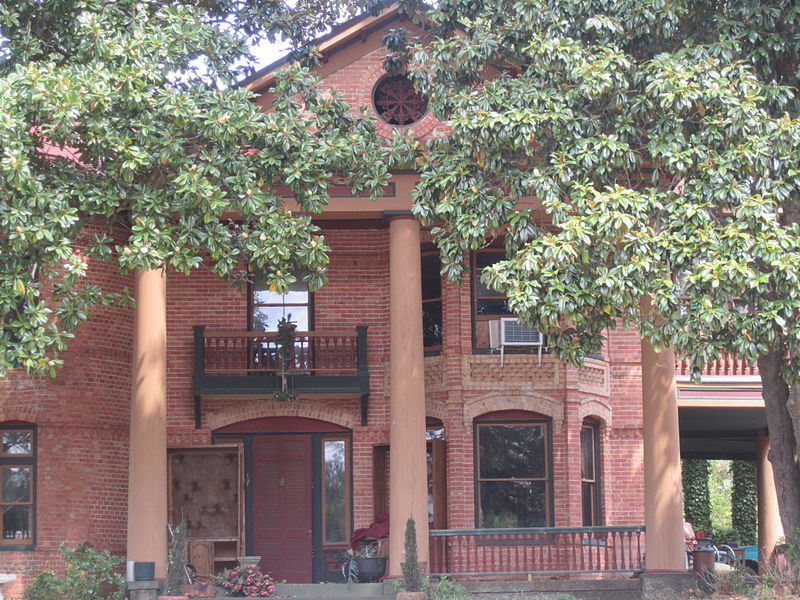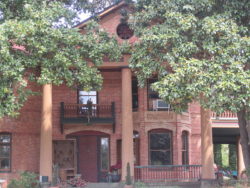John Watkins
Democrat John Watkins served as a US representative from northwestern Louisiana from 1905 to 1921.

Courtesy of Wikimedia Commons
John Thomas Watkins Home. Hathorn, Billy (Photographer)
John Thomas Watkins was a Democratic US representative from northwestern Louisiana who served from 1905 to 1921. A lawyer in his hometown of Minden, Watkins was a state district court judge prior to his election to Congress.
His father, John Dyer Watkins, arrived in Minden in 1850, fresh from his graduation at Cumberland College in Princeton, Kentucky, to become headmaster at the Minden Male Academy, a forerunner of Minden High School. While teaching at the school, the elder Watkins read law at night and was admitted to the bar in 1854, two months after he was named district attorney. He later served as a district judge and a state senator, and he financed the construction of the locally famous Shed Road, which linked the Minden area to the Red River at Bossier City prior to the arrival of the railroad. His brother, Lynn B. Watkins, followed him to Louisiana, became his law partner, and later became a justice of the Louisiana Supreme Court.
In 1852 John Dyer Watkins married Mary Morrow, daughter of planter John Thomas Morrow of Minden. John Thomas Watkins, the oldest son of the couple’s six children, was born on January 15, 1854. He was educated at the Minden Male Academy. After graduation, he attended Cumberland University in Lebanon, Tennessee. He was on pace to become the valedictorian of his class when he was forced to drop out during his senior year because his brother Lynn, also a Cumberland student, was suffering from a life-threatening illness. The brothers returned to Louisiana, and while Lynn regained his health, John immediately began reading law under the tutelage of his father. John Watkins later completed his degree. In 1878 he passed the bar exam and became a partner in his father’s law practice.
Religious Influences
On his twenty-fifth birthday, John Watkins married Elizabeth “Lizzie” Murrell, daughter of Drury Murrell, a prominent Minden businessman. He was elected a district judge in 1892 and then reelected without opposition for two additional terms. He earned a reputation for being firm but impartial. In 1902 Shreveport residents attempted to draft Watkins to run for Congress in the Fourth Congressional District against the incumbent, Phanor Breazeale, of Natchitoches. Watkins declined to make the race at that time, citing personal commitments to both his family and his church that made such a race impractical; one of those commitments would help set the stage for his future political success. In 1902 the Minden Baptist Church served as host for the Louisiana Baptist Convention. As the leading layman of the Minden congregation, Watkins was chosen to give the keynote address to the convention. After his address, he was elected president of the Louisiana Baptist Convention for 1902-03, further elevating his profile in the predominantly Protestant northwestern corner of the state. After serving his term as president, Watkins accepted the draft to challenge Breazeale in 1904 and won an easy victory with nearly fifty-eight percent of the vote.
A congressman for sixteen years, he became the chairman of the House Committee on Revision of the Laws in his fourth term. Watkins also served as a delegate to the Democratic National Convention in 1904, 1908, 1912, and 1916. At the 1912 convention in Baltimore, he was pledged to support his colleague, Speaker of the House “Champ” Clark of Missouri, for the party’s presidential nomination. Many of the local political leaders from northern Louisiana supported the more progressive Gov. Woodrow Wilson of New Jersey. After Wilson won the nomination and the presidency, Watkins still tended to side with Clark, who remained speaker and often challenged Wilson’s programs.
At home, meanwhile, his wife, Lizzie, and daughter Dana were diagnosed with severe breathing problems related to asthma, and doctors advised them to spend time in a dry climate. Watkins and his family began spending their time between congressional sessions in Arizona. As his returns trips to Minden became less frequent, Watkins faced a growing perception in the region that he was losing touch with his support base. The situation resulted in his first serious opposition in the election of 1918, when John Sandlin, also a native son of Minden, challenged Watkins in the Democratic primary. Sandlin, who had read law under Watkins’s brother, Lynn, was a friend of the congressman’s but had split with Watkins over President Wilson. Sandlin implied that Watkins’ failure to support Wilson was tantamount to not supporting the American war effort.
Watkins, in fact, had supported Clark in several measures that had limited Wilson’s efforts to advance the cause of war in 1917 but had since followed the patriotic line and given full support to the president. Without Sandlin’s knowledge, Shreveport labor unions bought ads pointing out that both men had sons of military age, and while Sandlin’s eighteen-year-old son, John Jr., was at that time a private in the US Army, serving in France, Watkins’s son was working as an aide to his father on Capitol Hill. The ads failed to report that Watkins’s son had been rejected by the military as unfit to serve due to a medical condition. Watkins won a narrow victory, but he lost every parish in the Fourth Congressional District except Caddo and DeSoto. Only a large win in Caddo provided the narrow margin of victory. Sandlin had won by a landslide in Webster Parish, both candidates’ home. In 1920 Sandlin and Watkins met on the ballot once again. Sandlin, eighteen years younger, was the energized candidate and won an easy victory. Like Watkins, Sandlin would also hold the Fourth District House seat for eight terms.
Bitter Defeat
The bitterness of the election made it impossible for Watkins to consider a permanent return to Minden. His daughter Dana had died in 1916, and shortly after his defeat, complications from asthma also claimed Lizzie. The couple’s only son, Will, died a few years later after many years of poor health. Watkins remained a resident of Washington, D.C., where he practiced law. He had two surviving daughters, one who lived in the family home on College Street in Minden and another who lived in Tampa, Florida.
Watkins died at age seventy-one of complications from a severe case of influenza at his Washington home on April 25, 1925. His funeral was held at Minden’s new First Baptist Church, which would not be officially occupied for another month and was considered the only facility in the city large enough to hold the crowd expected for the services. Watkins was buried next to his wife and daughter in the Drury Murrell family plot in the Minden Cemetery.
